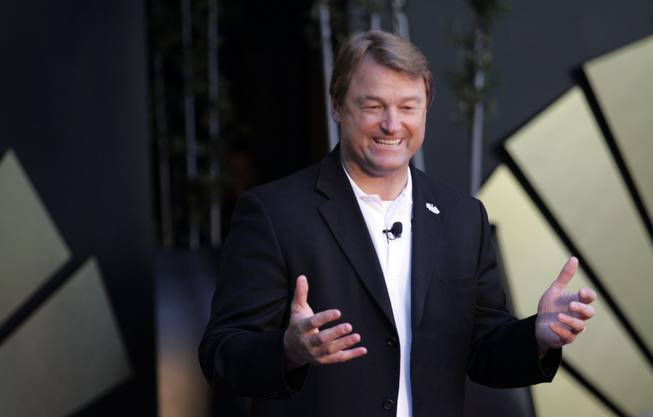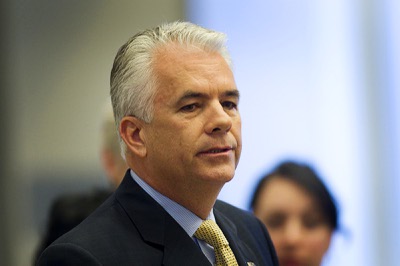
Sam Morris / Las Vegas Sun
U.S. Rep. Dean Heller speaks at the grand opening of the Mandarin Oriental at CityCenter, Friday, Dec. 4, 2009.
Friday, April 22, 2011 | 3:19 p.m.
Related Stories
- Until the end, Ensign a master of close-call politics
- Heller appointment to Senate changes campaign calculus
- Dean Heller could get boost, but can't shake bout with Shelley Berkley
- Sandoval: Sen. John Ensign replacement will be named before May 3
- Nevada’s special election laws not so clear, probably will result in lawsuit
Sun archives
Resignation Letter
Ensign Timeline
Sun Coverage
If Rep. Dean Heller is Gov. Brian Sandoval’s pick to take over John Ensign’s Senate seat, that opens up Nevada’s 2nd Congressional District for what could either be a public free-for-all to claim the spot, or a backroom coronation to produce an heir.
Secretary of State Ross Miller, once floated as a potential Democratic candidate for Ensign’s seat, would have the chance to make state history with it. Nevada governors have appointed people to fill one of the state’s Senate seats eight times -- most recently in 1974, when then-Gov. Mike O’Callaghan appointed Paul Laxalt to take over the seat Alan Bible retired.
But at no point in Nevada’s history has a Senate appointment created a vacancy in another part of the national delegation. In fact, Nevada’s never had to fill an open House seat -- and that means the untested rules on the books are a little unclear.
Some lawyers argue that state laws call for a general election, in which multiple members of each party could make a bid and avoid being winnowed out in anything resembling a traditional pre-election primary process.
The Nevada Revised Statutes say the governor has seven days after a vacancy is created to call for a special election, which has to happen within 180 days of that proclamation, no primaries allowed.
But the law also says it’s up to the secretary of state to decide how candidates declare their intention to run -- and that the central committees of major parties can pick their candidate for a nomination -- which, if allowed, means that even without primaries, there would still be one Republican and one Democrat, along with a whole host of potential independents.
Miller’s got his allegiances, of course. Even though the secretary of state’s office is non-partisan, Miller is a Democrat -- and the free-for-all option benefits Democrats. Just look at the recipe of the midterm elections: given enough options, Republicans split the field, and if that happens in a general and not a primary election, it would give a more-or-less coalesced Democratic party the opportunity to claim a seat they have never held in its existence.
The more streamlined-through-the-parties option, however, might give Republicans the opportunity to hit two birds with one stone: give Heller the Senate boost, and at the same time, pick off Sharron Angle.
The Nevada Republican Party splintered over Angle’s candidacy in 2010, and while many seemed ready to potentially concede the 2nd Congressional District seat to her if she pulled out a similar primary campaign, now they have a chance to alter that outcome.
Many in the GOP apparatus have a vested interest in such an outcome, not least of which is party chairman Mark Amodei, who is expected to be among the front-runners for the seat if he wants it.
So are Lt. Gov. Brian Krolicki and State Sen. Greg Brower, who threw his hat into the ring Friday.
Any of them would likely stand a better chance of getting the blessing of the GOP’s central committee than Angle, absent some significant groundswell of internal Tea Party pressure to put her on the ticket.
Free-for-alls are what Angle does best. Her come-outta-nowhere victory in the Republican primaries of 2010, if replicated in a district-wide special election -- if Democrats can’t field a viable competitor -- don’t just mean the nomination, they mean the seat.
But few things are as much a lock as they seem in CD2, not least of which is CD2 itself. Angle captured more votes in CD2 in 2010, but only by 20,000 votes (6 percent of registered voters in the district), and lost urban Washoe County by about 5 percent of the vote.
And not to get too existential, but in an era of redistricting, what is CD2?
No one is completely sure. But the creation of a new district is bound to shrink CD2 to some degree, meaning that the idea of creating some sort of incumbency, Democrat or Republican, in Heller’s seat if he moves up to the Senate is only as good as the map.
And the map, in turn, is only as good as when it's drawn. While redistricting is supposed to happen before the end of the session, most predict that other legislative priorities will force Sandoval to call a special session to get it done.
For Sandoval's party, that's best done sooner rather than later, because Democrats, who control the state Senate and Assembly, will undoubtedly benefit by waiting for the special election dust to settle before they put pen to paper.


Join the Discussion:
Check this out for a full explanation of our conversion to the LiveFyre commenting system and instructions on how to sign up for an account.
Full comments policy